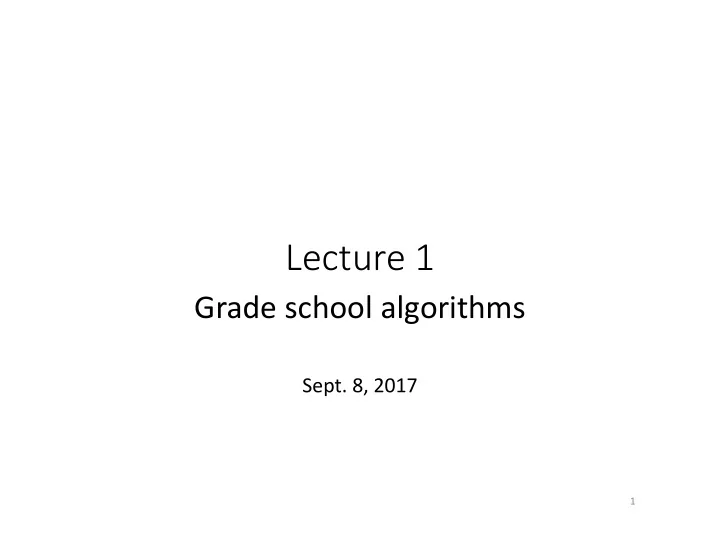

Lecture 1 Grade school algorithms Sept. 8, 2017 1
What is an algorithm? An algorithm is a sequence of instructions or rules or operations for manipulating data to produce some result. Think of an algorithm as a recipe. In CS, the recipe works with digital information such as numbers, text strings, images, sounds,…. See Khan Academy course on Algorithms for a good intro 2
Today: grade school arithmetic • addition • subtraction • multiplication • division You learned algorithms for performing these operations! 3
Grade school addition You needed to memorize single digit sums to do this. (Remember how you learned single digit sums?) 4
What is the algorithm for addition? Let’s use an array for a, b, and the result r. 5
Grade School Addition For each column i { compute single digit sum a[i] + b[i] and add the carry value from previous column determine the result r[i] for that column determine the carry value for the next column } 6
Grade School Addition (“pseudocode”) (To be explained on next slides.) 7
Grade School Addition (“pseudocode”) “mod” compute single digit sum a[i] + b[i] and add the carry value from previous column 8 determine the result r[i] for that column
Grade School Addition (“pseudocode”) “mod” Integer division (ignore remaider) determine the carry value for the next column 9
The grade school addition algorithm is non-trivial. It makes use of a good number representation : it represents each number as sum of powers of 10 . (Hindu-Arabic system invented ~2000 years ago) Do you understand how it works ? 10
Imagine an addition algorithm that is based on Roman numerals: It would be rather awkward! 11
Grade school subtraction 924 _ 352 572 How to write an algorithm for doing this? 12
Grade school subtraction 8 1 924 _ 352 572 How to write an algorithm for doing this? How to describe the “borrowing” step? (You will implement this in Assignment 1.) 13
Multiplication Q: What do we mean by a * b ? (assuming integers) 14
Multiplication Q: What do we mean by a * b ? (assuming integers) A: (a + a + ….. + a), b times a is the “multiplicand” b is the “multiplier” 15
Multiplication Q: What do we mean by a * b ? (assuming integers) A: (a + a + ….. + a), b times or (b + b + … + b), a times 16
The definition of multiplication suggests a slow algorithm: You learned a much faster algorithm in grade school. 17
Grade school multiplication “multiplicand” “multiplier” 18
Grade school multiplication Step 1: make 2D table tmp [ ][ ] 19
Grade school multiplication Step 2: for each column in table, sum up the rows // column // row 20
Grade school multiplication specifies that we build a temporary 2D array of size N*N. (the jaggy shape) In Assignment 1, you will implement an algorithm that does not use such a 2D array. 21
Division Q: What do we mean by a / b ? (assuming integers, and a > b) 22
Division Q: What do we mean by a / b ? (assuming integers, and a > b) A: We mean: “How many times can we subtract b from a before our answer is between 0 and the remainder ?” 23
Division Q: What do we mean by a / b ? (assuming integers, and a > b) A: a = q*b + r, 0 <= r < b q is quotient, r is remainder 24
Slow division algorithm To compute a / b, repeatedly subtract b from a until the result is less than b. You learned a much faster algorithm in grade school. 25
Grade school division (“long division”) 5 ... ______________ 723 41672542996 3615 ---- 552 ...etc How would you write out the algorithm? (You will do it in Assignment 1.) 26
Computational Complexity What do we mean by ‘fast’ and ‘slow’? Suppose we want to perform arithmetic operations on two integers a, b which have N digits each. How many ‘steps’ does each algorithm take ? 27
Grade School Addition 1 N 1 We mean that each part of the program is executed 1 or N times. 28
Grade School Addition c1 c2 * N c3 The time it takes is c1 + c3 + c2*N for some unspecified constants. When we analyze algorithms, we often ignore these constants. 29
Grade School Multiplication N N^2 N 1 N N^2 N 30
Computational Complexity We say… Grade school addition takes time O( ). Grade school multiplication takes time O( ). We will see a formal definition of O( … ) in a few weeks. 31
TODO • Install Eclipse. Tutorial next week (Wed for Sec. 001 and Thurs for Sec. 002) • MATH 240 issue for ECSE students 32
Recommend
More recommend